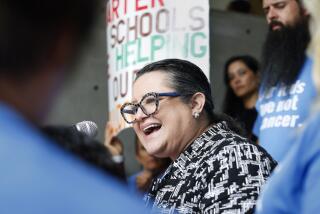Federal agencies weigh in on Bay Area juvenile hall lawsuit
SAN FRANCISCO -- The U.S. Departments of Justice and Education have weighed in on a federal lawsuit that alleges teens with disabilities were kept in solitary confinement for extended periods at Contra Costa County Juvenile Hall and denied legally mandated access to special educational services.
The federal agencies, which administer the Americans With Disabilities Act and Individuals With Disabilities Education Act, last week filed a statement of interest in the case in U.S. District Court in San Francisco, saying their authority and expertise should be considered.
They have asked the judge to deny defendants’ motions to dismiss the case and have requested to participate in oral arguments if those are heard.
The agencies have intervened under a statute that authorizes the attorney general “to attend to the interests of the United States” in any case pending in federal court.
The lawsuit was filed last summer on behalf of three teens, but plaintiffs’ attorneys are seeking to have it certified as a class-action on behalf of all youths with disabilities held in the county’s Juvenile Hall.
It alleges that youths placed on severe restrictions at the 290-bed facility in Martinez are confined to 12-by-12-foot solitary cells for up to 23 hours a day where they do not receive special education (or in some cases any educational) or rehabilitation services -- in violation of federal law.
The suit names Contra Costa County and its probation department, which operates the facility, as well as the Office of Education, which is overseen by the county Board of Education and operates a school inside the facility.
The plaintiffs are listed as G.F., who arrived at age 13 with bipolar disorder and ADHD and allegedly spent 100 days in solitary confinement with no access to educational services; W.B., a 17-year-old suffering from a psychotic disorder who while allegedly confined in a solitary cell for 90 days heard voices, talked aloud of conspiracies to harm him, spread feces on the wall and was ultimately hospitalized; and Q.G., who has allegedly been placed in solitary confinement for “weeks at a time.”
Q.G. had been in full-time special education for most of his life and arrived at the facility at age 14 with a diagnosis of oppositional defiance disorder and ADHD. Although his individual education program called for extensive daily services, the suit contends that the facility school cut his specialized academic instruction to 90 minutes a week and eliminated his mental health services and behavioral support plan.
An administrative law judge last month ruled that all three youths had improperly been denied services -- a ruling the county entities are appealing. Meanwhile, they are seeking to have the federal lawsuit dismissed.
In a recent motion, the county argues that detainees are placed on such restrictions because they are a “direct threat to safety” and that the services in question are therefore not legally required.
The county also contends that it is not responsible for providing special education services -- the Office of Education is. The Office of Education in its own motion, meanwhile, states that it cannot be responsible for denying special education and related services while youths are locked in restrictive security programs because the county has sole authority to discipline them.
Federal attorneys strongly disagreed, saying in their filing that shared responsibilities to meet the youths’ legal needs are outlined in a written agreement.
“Public entities cannot avoid their ADA and IDEA obligations by contracting, transferring them to, or sharing them with, another entity, especially one that is unwilling or unable to meet those obligations,” they wrote.
A hearing on the motion to dismiss is set for March 20.
The case comes as a growing body of research shows that solitary confinement of juveniles is damaging.
Citing an attorney general’s task force, the federal attorneys wrote that youths “experience symptoms of paranoia, anxiety, and depression even after very short periods of isolation” and that “confined youth who spend extended periods isolated are among the most likely to attempt or actually commit suicide.”
State Sen. Leland Yee (D-San Francisco) has introduced legislation that would significantly limit the practice.
Twitter @leeromney
More to Read
Start your day right
Sign up for Essential California for news, features and recommendations from the L.A. Times and beyond in your inbox six days a week.
You may occasionally receive promotional content from the Los Angeles Times.







